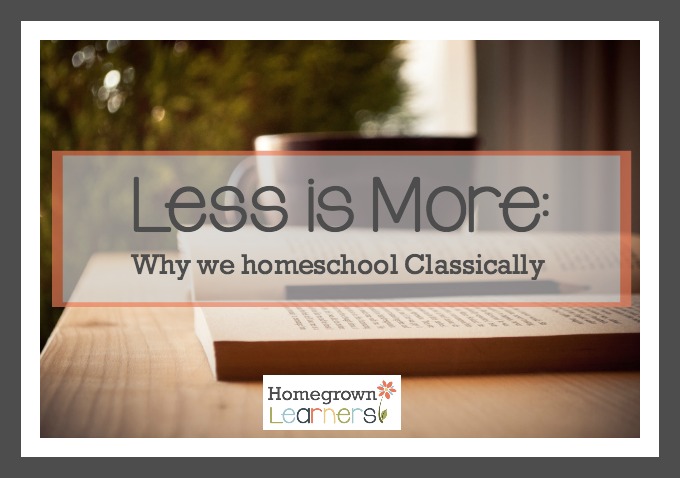Our homeschool journey has been just that.... a JOURNEY.
We abandoned the public schools seven years ago, eager to learn every possible thing we could about homeschooling.
Those first few years were spent getting our feet wet. Our way of life had dramatically changed, and we all needed time to adjust.
We always were diligent with school. We rowed beautiful books, used history as our spine, and took many field trips. I guess you could have called us "Interest Led", "Charlotte Mason", and at times "Unschooled".
( I don't regret a minute of those early years, because each of those moments led to the path we are on today. )
After nearly four years, however, we lacked direction -- and more importantly -- we lacked DEPTH and DIRECTION.
I couldn't see my children's education as a WHOLE - it seemed like many small pieces that didn't quite fit together.
We needed to make a radical change, but I didn't know what that change would be.
One day I decided to reread The Well Trained Mind.
A friend of mine suggested I read The Core (she also showed me her Foundations guide and timeline cards - wink).
Something in those books resonated with me... actually A LOT of principles resonated with me. The Classical model of education made SENSE to me. It made sense to me, even though I had not been educated Classically.
There was no need for bells and whistles --- a Classical education relies on the ideas of the past that have stood the test of time. I've been able to relax and rest in the fact that this Classical homeschool is more than enough for my children.
If you are a new homeschooler or contemplating homeschool, might I suggest investigating a Classical Education? (I have included a list of resources at the end of this post.)
I have seen it work for all types of children (children with learning disabilities, children with all different learning styles). I have reclaimed my OWN education in a way I never dreamed possible. And, most importantly, I believe it is a simple, beautiful way to bring our children closer to God.
A Classical education centers around the principles of God.
The virtues of knowledge, understanding, and wisdom are reflected in the grammar, dialectic, and rhetorical stages of learning.
“Knowledge is the comprehension of facts. Understanding is the reasoning of relationships. Wisdom is the application of learning.”
A Classical education is so beautifully SIMPLE, yet it allows our students to think in amazingly complex ways.
And, contrary to what I used to think, a Classical education allows my children to realize their God-given potentials. It equips them to learn ANYTHING and teaches them to articulate their passions and beliefs in a Godly, wise manner.
The Grammar Stage requires simple memorization, learning how to read, a math program, nature study, exposure to great art and music, and LOTS of living literature.
For the past three years my son has simply been memorizing facts given in the Foundations memory work. These lay the groundwork for future learning; he will draw upon all he has memorized when he hits the Dialectic Stage.
Yes, it really is THAT simple.
Memorize facts in the areas of science, history, Latin, English grammar, geography, and timeline.
Choose a math program that emphasizes DRILL and REPETITION (We love Saxon in the early years.)
Expose your children to great artists and great music.
Take them on nature walks and let them experience God's beauty firsthand.
And READ, READ, READ.
Read aloud. Provide many types of books all throughout your home. Take your children to the library. Model reading for your children.
Once you do these simple things there is ample time left over, and your child will naturally fill that time with what interests them, whether it is time outside, drawing, building, or simple PLAY.
The memorization of rivers in Africa led to my son creating the continent out of LEGO bricks and using this as a presentation on community day.
A Classical Homeschool education allows our littlest ones to explore and play, while at the same time ensuring they memorize a body of knowledge that sets them up for learning in the middle grades years.
While the Grammar Stage focused on FACTS, the Dialectic Stage now focuses on UNDERSTANDING THOSE FACTS and presenting that understanding in a deeper way.
I love this example: My son (in the Grammar Stage) memorized the classification of living things. He simply can tell you "Kingdom, Phylum, Class, Order, Family, Genus, Species". My daughter (in the Dialectic Stage), however, chose an animal and completed a taxonomy project about that animal. She also learned about famous scientists (Linnaeus - the Father of Modern Taxonomy) being one of them.
This was her project in Challenge B. I had NOTHING to do with the project. She was inquisitive and creative all on her own.
Doing this type of activity with a young child would have been mostly busy work, and they wouldn't have understood it nearly as well as a child in the Dialectic Stage.
The lightbulb will go on for a student in Classical Conversations Challenge B because they have memorized the Classification of Living Things in Foundations, and NOW they get to apply that knowledge, and present it to their peers.
Simple and beautiful.
The Rhetorical Stage allows our children to think abstractly and express what they know in the most deep and meaningful way possible.
I am just beginning to see the INCREDIBLE fruits of the Rhetorical Stage.
After years of memorizing math facts, and endless hours of drill and repetition, math is beginning to CLICK for my daughter.
At the beginning of this year (Challenge I -- roughly 9th grade) I watched her teach the Order of Operations to her classmates. This seemingly simple concept (remember "Please Excuse My Dear Aunt Sally"?) turned into a lesson at the whiteboard and a conversation about WHY she chose to solve a certain problem in a certain way.
This is a child who NEVER would have volunteered to come to the front of the class and explain a math concept. Look at her now!
This year I have also watched my daughter work through a music theory curriculum. It has involved learning all of the GRAMMAR of reading music. After drilling this grammar (note names, time signatures, etc...), the students are then applying their knowledge through the analysis of a hymn score. Sharing this knowledge with their class will be the final - Rhetorical - piece to the puzzle.
The diligence, repetition, and yes - frustration - produces a learner that is inquisitive and thorough.
(Side note: I have been working through the curriculum and have a better understanding of music theory than I did in college -- and I was a music MAJOR!)
Anna will also get to see how everything in a score of music so intricately comes together to produce something beautiful - hymns that touch our hearts and souls.
A Classical Homeschool education gives me the peace of mind to know my children are getting everything they need, while still keeping their primary focus on their Creator and an appreciation of goodness, beauty, and TRUTH.
I am so thankful we found this way of home education. I am thankful we chose to become a part of Classical Conversations - although this is not the ONLY path to a Classical homeschool education. There are many others.
When we first started homeschooling I knew I wanted to give my children MORE than they were receiving in the public schools.
I never dreamed I could give them THIS MUCH.
The "Short List" of Classical Homeschool Resources
These are the resources that have proven helpful to me over the past several years. I won't burden you with too many... remember - less is more!






